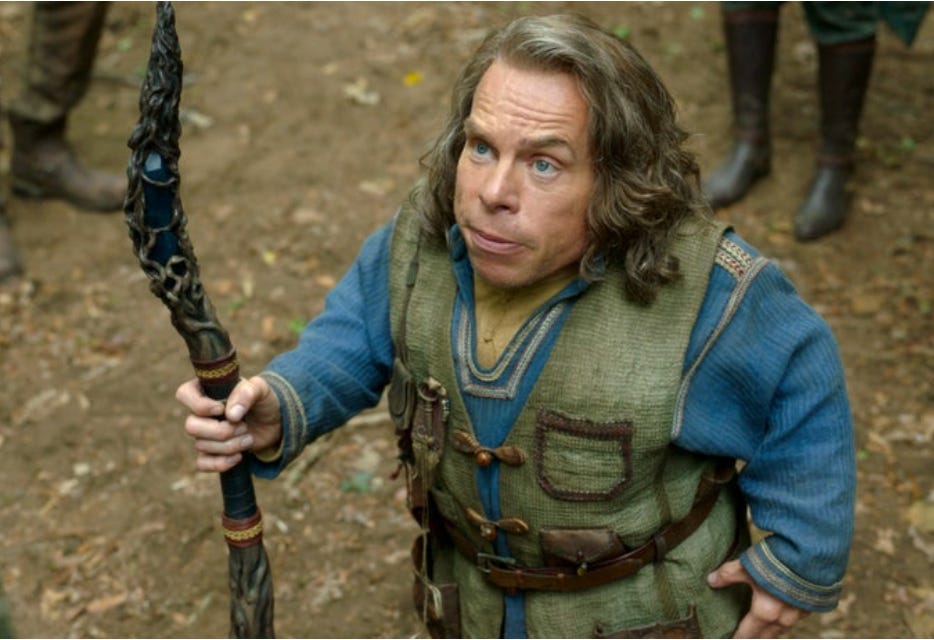'Willow' Can Move From Cult Classic to Mass Appeal, According to Critics
Warwick Davis in 'Willow'
Disney+They might be known as the streaming wars, but the continued struggles between Netflix, HBO Max, Disney+, and others should be called the battle of IP.
For the last several years, folks at the streaming powerhouses have mined their intellectual properties to turn nostalgia — and mostly well executed concepts — into money. In 2018, YouTube did as much when they releasedCobra Kai, aKarate Kid spin-off focused on the adventures of a high school bully and the kid he picked on adapting to a new world. Earlier this year, the folks at Amazon Prime Video took on a similar strategy when they released The Lord of the Rings: The Rings of Power, a Lord of the Rings prequel that chronicled the events that preceded the story of J.R.R. Tolkien's fantasy epics. With their access to Star Wars, Disney+ has done the same with various spin-offs based on the George Lucas-created franchise. Now that streamer is returning to a familiar playbook with Willow, a new sequel series based on 1988 the Lucas-executive-produced dark fantasy film of the same name.
The original Willow followed the adventures of the eponymous diminutive sorcerer (played by Warwick Davis), who rescues an infant girl named Elora from the evil queen Queen Bavmorda (Jean Marsh), who Elora is destined to defeat. While the flick was met with mixed critical reception upon its 1988 release — it has a Metascore of 47 based on 12 reviews — it's since become the proverbial cult classic, with its camp and Davis' charismatic turn in the titular role securing its status as a charming slice of yesteryear — fertile ground for reinvention.
After seeing varying amounts of Season 1, critics have offered largely positive takes on the follow-up series, which chronicles the adventures of a grown-up Elora (Ellie Bamber) and her friends as they once again face a looming evil. The series currently holds a 70 Metascore based on 22 reviews. Needless to say, it's a pretty sizable level-up, one largely explained by divergences from tired fantasy tropes and an increased emphasis on personality.
The Los Angeles Times' Sheila Benson called the movie a "perfectly agreeable tale of magic, little people, heroic warriors," but it was also lambasted for its hackneyed plot and a lack of character development. Writing for Chicago Sun-Times upon the original film's release, the lateRoger Ebert noted that the special effects were competent, but the movie lacked the story to make them particularly compelling. "The characters in 'Willow' are shallow and unexciting, and the story is a plod through recycled legend," he said at the time.
For the Chicago Tribune, Dave KehrI wrote that Willow was more of a "collection of morbid symptoms: a labored, arrhythmic narrative; a pathetic dependency on recycled themes and borrowed images" than it was an actual film. Nominally speaking, the original Willow does, in fact, share many similarities with plenty of fairy tales, the schematics of modern fantasy films that had become extremely popular by the end of the 1980s.
Thirty-four years later, the Disney+ spin-off remains tethered to the whimsy of its predecessor, but there are plenty of distinct identities. She might be the eventual savior of everyone she knows, but Elora usually works as a kitchen maid, and she only becomes aware of her destiny at the beginning of this series. Princess Kit (Ruby Cruz) and Prince Airk (Dempsey Bryk) are royals in a fantastical European-esque milieu, but they abandon any medieval dialects, unloading plenty of sardonic barbs at one another as they infuse the series with a whip-smart spirit. Jade (Erin Kellyman) is a knight in training who balances her warrior aspirations with a relationship with Kit and an intense rescue mission. As Decider's Meghan O'Keefe notes, "Willow remains true to the '80s film while bringing a 2022 attitude to the screen."
While he noted that the show can get lost in its mythology and mediocre fight choreography, RogerEbert.com's Clint Worthington had positive words for the main characters' decidedly modern speech patterns and a script that gave them proper individual motivations that push the story along, as well. "Everyone has something to prove to themselves and the kingdom, and [creator Jonathan] Kasdan and crew find a remarkable balance for each of their endearing characters," he wrote.
Collider's Maggie Boccella also gave the Disney+ series props for its characterization, highlighting the way separate arcs are allowed to co-exist without slowing down the show by saying, "Willow manages to avoid the dreaded 'too many cooks in the kitchen' problem by keeping its central characters together, weaving conflicts and motivations together into one chaotic, colorful tapestry."
Critics concede that both entries into the Willow franchise are tied to a fairly standard fantasy plot, with none of them labeling the Disney+ series as anything transcendent. And yet, there's promise, especially when you look back at how the film was received.
Imbued with such a predictable story, the original film was probably always destined to be confined to niche movie watchers. With improved characterization and an entertainment ecosystem that's more willing to take risks on kooky IP, the new series has given itself a chance to avoid the same fate.
